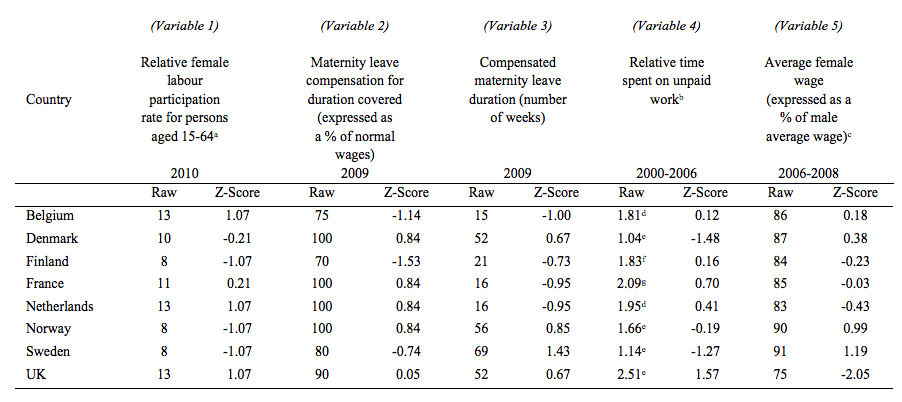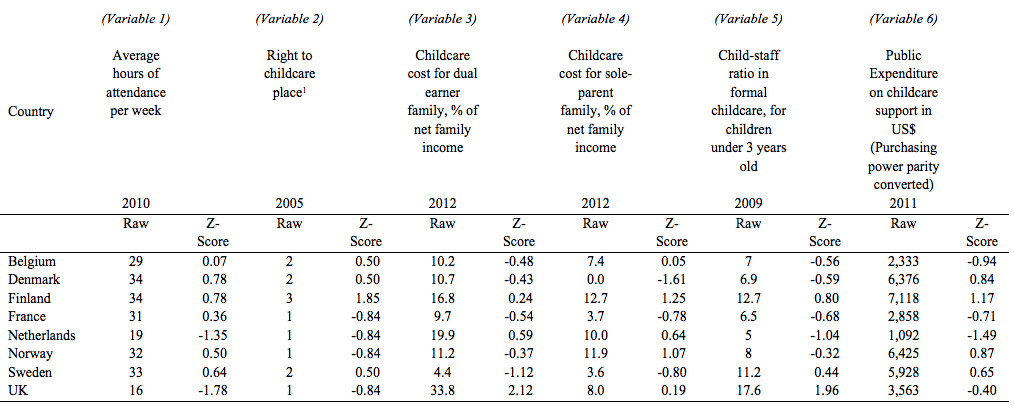

 How does the UK compare with other European countries in relation to family-friendly policies? Liam Foster, Ruby Chau and Sam Yu look at eight European countries and develop two new indices on ‘defamilisation’, the degree to which social care measures make it possible for people to participate in activities outside their home. Their research shows that the UK still has much to do to moderate economic inequalities in older age between men and women.
How does the UK compare with other European countries in relation to family-friendly policies? Liam Foster, Ruby Chau and Sam Yu look at eight European countries and develop two new indices on ‘defamilisation’, the degree to which social care measures make it possible for people to participate in activities outside their home. Their research shows that the UK still has much to do to moderate economic inequalities in older age between men and women.
Women are typically overrepresented in pensioner poverty. On average, in the EU the percentage of men aged 65+ at risk of poverty is less than 15%, compared with over 20% of women. These trends reflect women’s constrained opportunities across the life course, including their greater likelihood of undertaking caring responsibilities, its impact on employment and, subsequently, women’s increased chances of reaching retirement with inadequate pensions.
The level of gendered inequalities is affected by the extent to which pension systems address these diverse experiences and compensate for relative disadvantages in the division of work and care, including the use of care credits. Unfortunately, typical male working patterns are still largely the reference point for calculating pensions in most countries, with gender differences in work and care often overlooked.
What are defamilisation measures and why do they matter?
Given these trends, it is important to explore countries’ strategies to enable women to participate in paid employment and contribute to pensions in their own right, including the use of defamilisation measures and reward periods of care. Two defamilisation indices are now used to look at how policies regarding defamilisation might affect women’s pensions. These are termed individual-based and state-led care-focused defamilisation. The individual-based defamilisation measures are concerned with how welfare enables women to survive as independent workers. The state-led care-focused defamilisation measures focus on the extent to which family caring responsibilities are relaxed via policy measures.
Table 1, focusing on the individual-based defamilisation indicators, shows considerable differences in the 8 countries experience of these measures. The UK tends to fare unfavourably compared with the other countries. It has higher than average Z-scores in the indicators associated with the relative female labour participation rate and relative time spent on unpaid work, and has a low Z-score in the indicator related to the average female wage. While the UK compares slightly more favourably in relation to maternity provision, it still tends to lag behind most of the other countries. For instance, Denmark, Norway, and Sweden have low Z-scores in the indicators concerned with the relative time spent on unpaid work and the relative female labour participation rate (for persons aged 15-64), and high Z-scores in the indicator concerned with the average female wage.
Table 1. Individual-based defamilisation indicators

Notes: a Calculated as the difference between the female and male labour participation rate; b Calculated as the difference between the female and male average time spent on unpaid work; c Wages in manufacturing. Unless otherwise noted, data refer to the latest year available in the given interval; d Data from 2005; e Data from 2001; f Data from 2000; g Data from 1999. (Source: United Nations, 2010)
The UK also tends to lag behind the other countries when considering the state-led care focused defamilisation indicators in Table 2. For instance, the UK has a low Z-score in relation to the average hours of children’s attendance in childcare per week, and a high Z-score in terms of childcare costs for a dual-earner family as a percentage of net family income. There is a significant negative correlation between the average hours of attendance per week and the relative female labour participation, and a similar significant negative correlation between the average hours of attendance per week and the relative time spent on unpaid work. Once again, the social democratic countries, Denmark, Norway, Sweden, and Finland fared most favourably in relation to these indicators with the conservative countries France, Netherlands, and Belgium tending to perform less well, but not to the extent of the UK, which represents the liberal regime.
Table 2. State-led Care Focused Defamilisation Indicators 
Note: Those countries that offered a legal right to childcare for all under 3-year-old children were given value 3, countries where this right was limited to same age or user groups or to certain regions were given value 2, countries that offered no right for the service were given value 1. (Source: OECD, 2014)
What does this mean?
It is evident from these indices that there are considerable differences between the countries, with the UK’s defamilisation measures particularly limited. Given the links between employment and pensions it is not surprising that the UK (43%) has a wider than average gender pensions gap. Considerable disparities also exist between working age men and women’s pension contributions in the UK. The gender pension gap (aged 65+) in the Netherlands (40%) and France’s (39%) is around the EU average, whereas the social democratic countries in the study are all considerably below average.
It is therefore clear that those countries with less generous defamilisation measures are also those countries with the largest gender gaps in pensioner poverty. Moves towards individual responsibility and private pensions may be especially problematic for women in the UK given the limitations of many of the defamilisation measures. There is a real danger that pension penalties arising from earlier caring roles and insufficient defamilisation measures will lead to increasing gender inequality in older age.
What can be done? Develop strategies to enhance women’s freedom to choose
There is a need for policymakers to recognize the different trajectories often faced by women and not penalise women who diverge from typical male employment patterns. This means developing strategies to enhance women’s freedom to choose between work and care, in part through defamilisation measures, and different ways of accumulating pensions.
Pension systems could be redeveloped to de-couple income in retirement from paid employment, and thus avoid the penalty for caring years incurred in private pensions. One option would be to introduce an unconditional Citizens Pension, funded through progressive taxation, and set at an adequate level.
In effect, the UK needs to move beyond policy that solely reinforces the liberal celebration of better paid employment in the labour market and explore ways to reward all forms of work, including unpaid labour. Without such developments, the UK will continue to lag behind many other EU countries in relation to gender inequalities and pension accumulation.
______
Note: this post draws from the authors’ published article in the Journal of Poverty and Social Justice.
 Liam Foster is Senior Lecturer in Social Policy and Social Work at the Department of Sociological Studies, University of Sheffield.
Liam Foster is Senior Lecturer in Social Policy and Social Work at the Department of Sociological Studies, University of Sheffield.
 Ruby Chau is Marie Curie Research Fellow at the Department of Sociological Studies, University of Sheffield.
Ruby Chau is Marie Curie Research Fellow at the Department of Sociological Studies, University of Sheffield.
 Sam Yu is Associate Professor and Social Policy Programme Director at the Department of Social Work, Hong Kong Baptist University.
Sam Yu is Associate Professor and Social Policy Programme Director at the Department of Social Work, Hong Kong Baptist University.
All articles posted on this blog give the views of the author(s), and not the position of LSE British Politics and Policy, nor of the London School of Economics and Political Science. Featured image credit: Pixabay/Public Domain.






The same is true of every pensioner whose pension is directly linked to the pay grade they had working in the public sector, with wages having been constrained, unless you are a senior manager or politician every one with a public pension is far worse off, to just say women are being discriminated against is missing the point.
I read this at the beginning : “How does the UK compare with other European countries in relation to family-friendly policies?
Have you looked at the UK state pension policy towards pensioners abroad ?
Have you heard of the Frozen pension policy which denies a pensioner, who is abroad in certain countries, any pension indexation ?
Should a pensioner living in the UK wish to emigrate to a country for health reasons or to join family already abroad then depending on the chosen country they could get the usual pension annual increases or they could never see any increase ever to their pension from the time that they leave.
There are about 550,000 pensioners affected by this discriminative policy who never get their paid for indexation making up about 4% of all pensioners worldwide while the majority 96% all enjoy the pension that they qualified for without a problem.
It is to be noted that all pensioners are required to pay mandatory contributions to the National Insurance Fund along with that of their employers when working. It therefore follows that all pensioners have earned the pension in retirement.
An article about this would be interesting given responses from pensioners and politicians plus any of your guests from various pension groups..